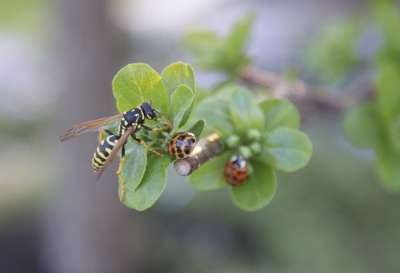Wednesday, March 21st, 2012
Bugging us early
Unusual weather cues allergies, insects
By Shelley Grieshop

Photo by Shelley Grieshop/The Daily Standard
Recent unseasonably warm temperatures have brought insects and pollen to the area several weeks earlier than would normally be expected.
The unseasonably warm weather is sprouting more than daffodils.
Allergy season arrived several weeks earlier than normal this year due to the summer-like temperatures. Residents across the region are experiencing the classic itchy eyes and congestion that typically hits in mid-April.
"Noticed it about two weeks ago," Bill Black of Rockford said.
He initially blamed his runny nose on the fluctuating temperatures but eventually sought allergy medication for relief.
Dr. John Naveau, a family physician from Coldwater, said the early appearance of blooms and foliage will unfortunately extend the allergy season - and its misery.
"On top of that, it has been very, very wet, which will probably increase the amount of mold in our area," he said. "That, combined with the fact that we all love being outside, will probably make it a tough year for allergy sufferers."
Naveau advises patients to first try over-the-counter antihistamines to combat the sniffles, sneezes and other symptoms.
"If that doesn't work, there are other treatments that a physician can provide," he said.
More than 40 million Americans deal with allergies each spring. The main culprit is tree pollen, but plants, grasses and weeds also can contribute when their small, dry pollen granules are carried through the air.
The Asthma and Allergy Foundation of America recommends keeping windows and doors closed and setting the air conditioner on recirculate. Vacuuming will help keep indoor allergens to a minimum.
Experts say staying indoors in the morning is best since trees tend to pollinate early in the day producing high pollen counts.
Insects also have emerged ahead of schedule, according to Dan Herms, an entomologist with Ohio State University.
"We're about two weeks ahead of the earliest spring we've had since 1997," he said.
Despite the myths, bugs don't multiply out of control after mild winters and aren't wiped out by harsh winters, Herms explained.
"Most of them aren't affected by winter unless it gets really, really cold," he said.
Mosquitoes already have appeared in the Wooster area where he works, he said. Bees and other insects also are visible, he added.
Herms also noted that most perennials will be OK if winter weather returns.
"They're used to the cold weather. Daffodils commonly get snowed on, and it doesn't really affect them for the most part," he said.
However, he advises against planting vegetables and tender annuals until the risk of frost is past, typically early May in Ohio.
Meanwhile, Grand Lake area residents should grab tissues, if needed, and enjoy the outdoors while the warm temperatures last. Highs by Friday will drop from the 80s to the 60s - the normal range for this time of year.


